What strikes many visitors to downtown Seattle is how
easy it is to see the sights, since key attractions lie within walking
distance of one another. Bookended by Belltown to the north and Pioneer
Square to the south, downtown can be seen on foot or by city bus at no
cost – since all of it lies in the Ride Free Zone. Alternatively, for a
small fare, the waterfront streetcar stops at several key points between
the Market and the International District. In addition to being a
business district full of skyscrapers, downtown offers a wide range of
options – such as gourmet restaurants, attractive shopping centers, and a
perfect place to begin exploring the city.
|
Named after one of the
city’s founders, Arthur A. Denny, Denny Hill would have certainly become
one of Seattle’s most upscale neighborhoods, with magnificent city,
mountain, and water views. However, in 1905, engineers began its
outright removal by extracting the mud with water jets and conveyor
belts, eventually dumping the debris into Elliott Bay. Today, the
unnaturally flat, 50-square-block area includes most of what’s now
called Belltown, and is occupied largely by warehouses, labor union
halls, motels, and car lots.
|
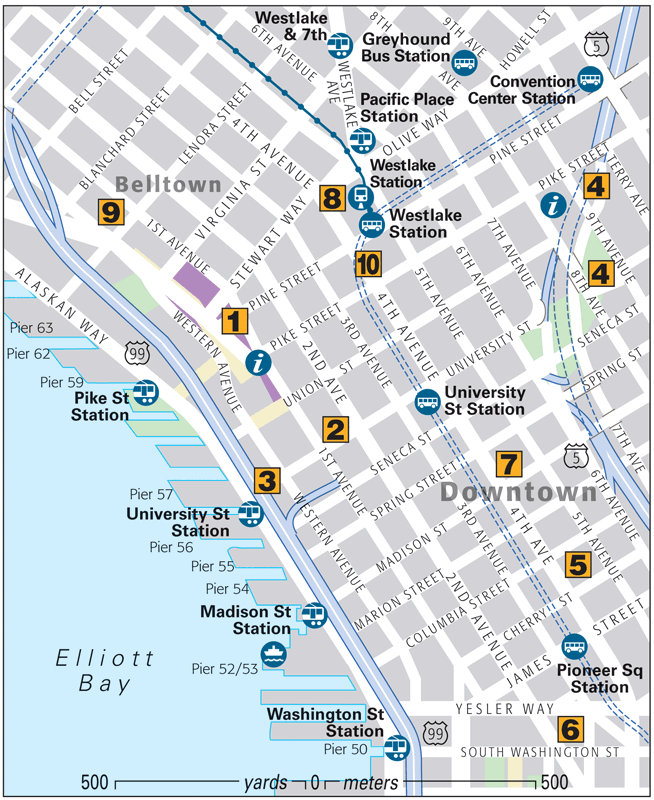
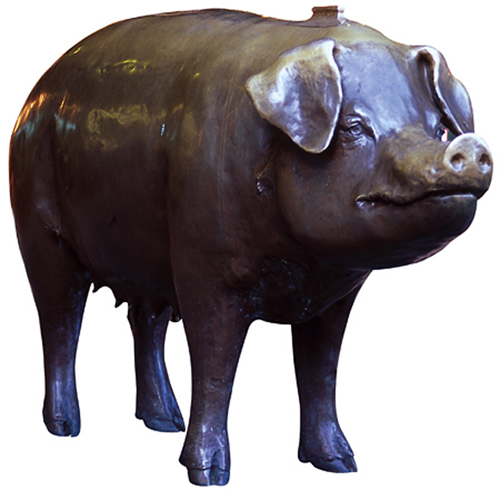
Rachel, the Market pig
|
Many seafood vendors at Pike Place Market package fish for long-distance travel.
|
|
|
Head inside the Koolhaas Library for a visual treat as spectacular as the glass and steel exterior shell.
|
|
|
Be sure to leave the bus while still in the Ride Free Zone; if you stay on beyond the boundary, you’ll have to pay upon exiting.
|
|
SightsPike Place Market Anyone
descending on Pike Place Market to stroll by innumerable stalls of
seafood, fresh produce, crafts, and flower bouquets can feel the rapid
pulse of a scene that’s all about hard work and hustle. The Market is
famous for its salmon-throwing fishmongers and street musicians who
entertain tourists daily.
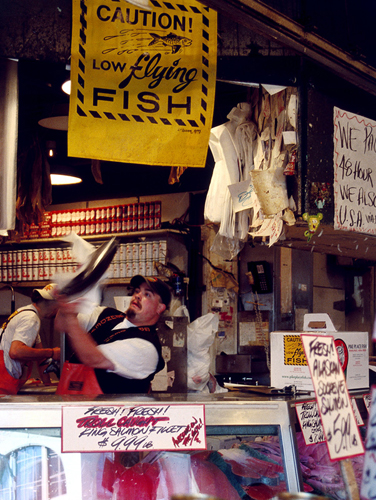
Fish-flinging fishmongers
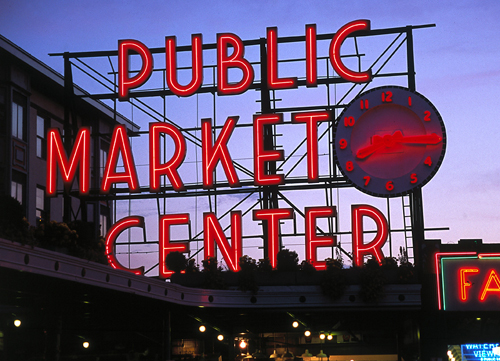
Pike Place Market
Seattle Art Museum Designed
by Venturi Scott Brown and Associates, the imposing sandstone and
limestone edifice houses an enviable permanent collection of about
23,000 pieces. The African collection inspires with traditional
sculpture, masks, textiles, basketry, and decorative arts. The John
Hauberg Collection, one of the most prized examples of Northwest Coastal
Native American art, comprises nearly 200 artifacts from British
Columbia, Alaska, Washington, and Oregon. The museum is undergoing
extensive refurbishment until spring 2007. The construction of a new
Olympic Sculpture Park in downtown Seattle is also underway.
Harbor Steps If
you happen to be near the Seattle Art Museum on First Avenue and need
to get down to the waterfront, try the Harbor Steps. A street’s abrupt
end has been turned into a wide-open stairway landscaped with water
sculpture and planters. The steps are spacious and an ideal urban
meeting place, located below a nouveau luxury apartment complex in the
heart of an ever-changing downtown Seattle. Countless restaurant and
nightlife options abound in the vicinity. Washington State Convention Center/ Freeway Park Straddling
Interstate 5 in a miraculous feat of engineering, the Washington State
Convention Center is located within easy walking distance of the city’s
best shops, hotels, and restaurants. Marvel at the center’s 90-ft (27-m)
wide glass canopy bridge that frames views to Elliott Bay and to the
historic Pike-Pine neighborhood. Adjoining is Freeway Park, where
blossoms delight visitors in spring and waterfalls mask the sounds of
traffic flowing on all sides. Washington State Convention CenterFreeway ParkColumbia Tower The
sleek, three-tiered black skyscraper that dominates Seattle’s skyline
might have been even taller, but for an order to reduce the ultimate
height from the Federal Aviation Administration. To break a record for
most floors in any one building, the builder kept the original 76
stories but reduced the ceiling heights to compensate. The 1985 building
has an observation deck on the 73rd floor that offers panoramic views
of Elliott Bay and Mount Rainier.
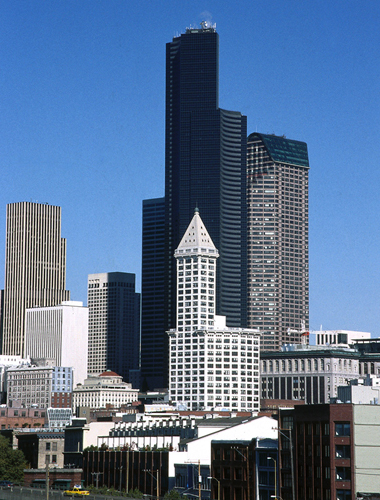
The tall, black Columbia Tower
Pioneer Square Find
art galleries, intricate Victorian architecture, bookstores, and cafés
in a constantly changing National Historic District. Pioneer Square’s
20-block neighborhood became Seattle’s commercial center during the boom
years of logging, fishing, railroads, and Klondike Gold Rush economies.
An exclusive 90-minute underground tour offers a lively look at the 19th-century storefronts that were
periodically flooded by tides from Elliott Bay until street levels were
raised. Key sights include the Smith Tower, Elliott Bay Book Co. and
Café, and an art walk on the first Thursday night of each month.
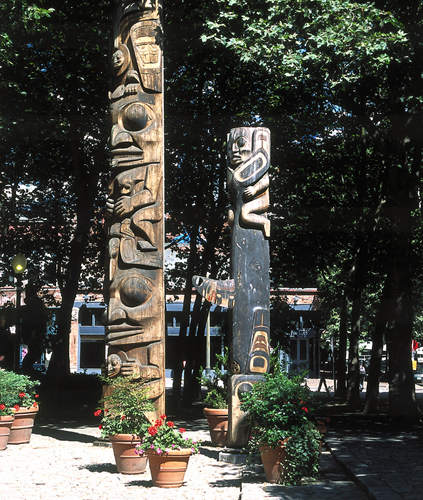
Totem poles, Pioneer Square
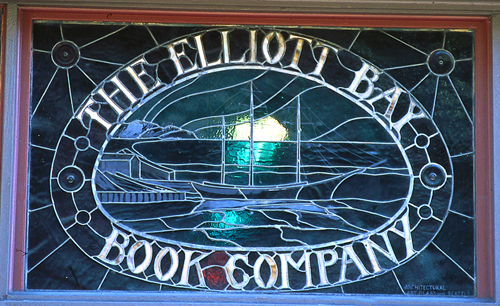
Elliott Bay Book Company
Koolhaas Library Completed
in 2004, the new downtown library is a work of art. Nearly 8,000
patrons per day benefit from more than 1.45 million books and reference
materials, Internet access, spacious areas for children, and over 400
public computers. The art collection alone is worth $1 million.
Monorail In
2005, Monorail services were suspended due to a collision between
trains. By mid 2007 you’ll be able to hop aboard once again to
experience the future of mass transit from the perspective of engineers
who built the elevated rail as an attraction for the 1962 World’s Fair.
The Monorail travels speedily and nonstop for 1.2 miles (2 km) between Seattle Center and Westlake Center.
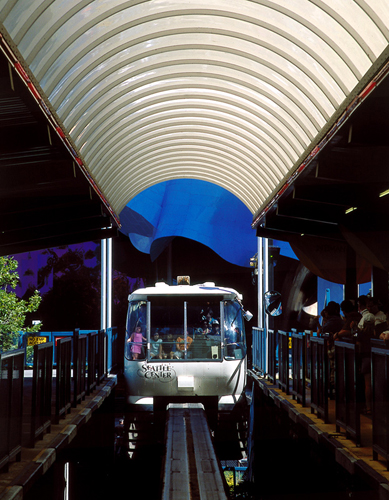
Monorail at Seattle Center Station
Belltown Pedestrians
are welcomed with an explosion of shops, clubs, cafés, luxury condos,
and fine restaurants. This upscale neighborhood was named in the 1970s
after a pioneer, William M. Bell. In those days, Belltown attracted
sailors on shore leave, artists seeking inexpensive loft spaces, and
ragtag urban dwellers. But it was the dot.com boom of the 1990s that
changed everything by engendering a commercial revival for the
neighborhood. Remnants of old Belltown include a few well preserved
façades. Ride Free Zone The
downtown sightseeing area between Belltown and Pioneer Square falls
within the city’s Ride Free Zone where fares are gratis. Hop on a street
level bus within the Zone and don’t forget to check in with the driver.
All stations in the Downtown Seattle Transit Tunnel (DSTT)
are within the Ride Free Zone but during tunnel closure buses along 3rd
Avenue are free between 6–9am and 3–6pm, and the Ride Free Zone is
extended to include the stops at 9th Avenue and Howell Street.
|